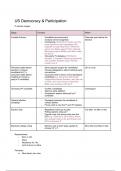Summary
Summary Edexcel Alevel US Government and Politics- notes on US Democracy and Participation
- Course
- Institution
- Book
Help with Pearson Edexcel A Level US Government and Politics. Includes notes on The US Democracy and participation, alongside essay plans in a table format. Evidence and quoted are colour coordinated to help with easy access. Information is perfectly concise and up to date ( up to 2023). Includes ...
[Show more]




